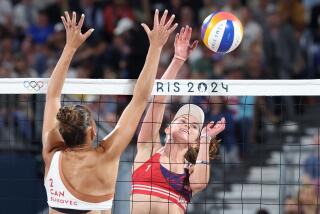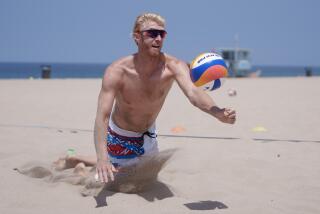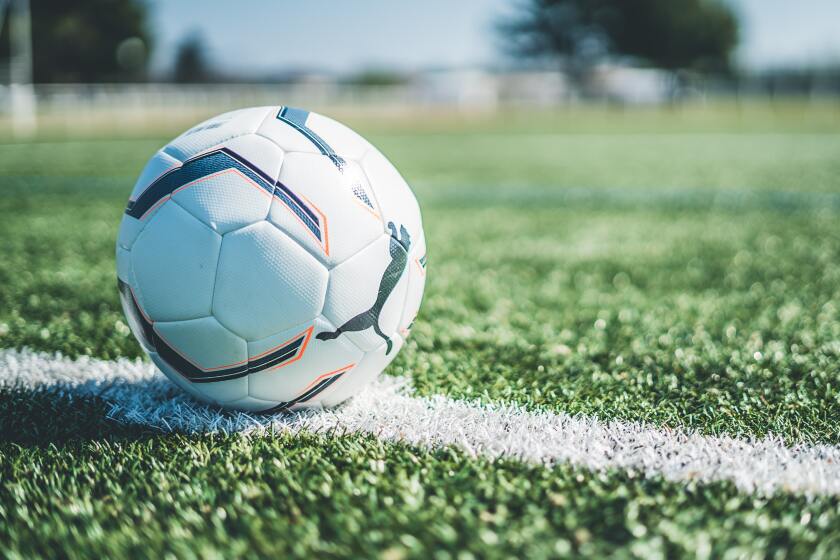With Television in Control, Top-Seeded Brazilians Aren’t
- Share via
Bottom line on Friday’s two-man competition in the 1997 World Championships of Beach Volleyball at UCLA:
Television rules, Jose Loiola doesn’t.
Loiola, the top-ranked player on the Association of Volleyball Professionals tour and one-half of the top-seeded team in the two-man division here, didn’t make it out of the quarterfinals--largely because a made-for-TV match schedule permitted Loiola and partner Anjinho Bacil only 45 minutes rest between their second- and third-round matches.
Playing their second-round match at 10 in the morning, Loiola and Anjinho worked overtime to dispatch the 16th-seeded Laciga brothers--Martin and Paul--of Switzerland, 12-10, 9-12, 16-14, in 96 grueling minutes.
As Brazilians playing on American soil, in a tournament beholden to the interests of American television networks NBC and ESPN, Loiola and Anjinho were playing at a severe disadvantage.
Given a choice of one evening quarterfinal featuring four Brazilians or another that included Americans Karch Kiraly and Adam Johnson, NBC opted for the red, white and blue.
That decision gave Kiraly and Johnson four hours to recover from their second-round match--and consigned Loiola-Anjinho to a side court and an early afternoon starting time, barely 45 minutes after the end of their second-round victory.
Drained, Loiola-Anjinho were primed for an upset--and Brazilian countrymen Guilherme and Para completed the assignment, eliminating the tournament favorites in 79 minutes, 12-7, 12-6.
“I think we got tired,” Loiola said. “We had a really tough [second-round] game and didn’t even have a chance to think about this one and we played this game right away.
“So maybe they should have given us a little more time. Especially because we have all day long to play.”
When Kiraly and Johnson lost to Paulo Emilio and Paulao in their night quarterfinal, 12-6, 5-12, 12-8, today’s semifinal matchups became strictly intramural affairs.
The 10 a.m. semifinal is an all-Brazilian pairing: Guilherme-Para against Paulo Emilio-Paulao, the field’s fourth-seeded team.
Two American duos will meet in the noon semifinal: Second-seeded Dain Blanton and Kent Steffes against third-seeded Mike Whitmarsh and Canyon Cemen.
Blanton-Steffes advanced with a 12-4, 12-3 victory over the 10th-seeded American team of Ian Clark and Troy Tanner, 12-4, 12-3, and Whitmarsh-Cemen ousted the sixth-seeded Brazilian side of Emanuel and Ze Marco, 12-5, 12-4.
Both the men’s semifinals and final will be played today, with the final set for 4 p.m.
In the women’s final, to be held today at 2 p.m., top-seeded Americans Lisa Arce and Holly McPeak will face the 1996 Olympic gold medalists of Brazil, Sandra Pires and Jackie Silva.
Arce-McPeak advanced to their 14th championship final in 17 events this year with a 12-4, 12-9 victory over the 12th-seeded U.S. team of Karolyn Kirby and Nancy Reno.
Pires-Silva, seeded third here, reached the final with a 12-11, 4-12, 12-3 victory over Brazilian rivals Shelda Bede and Adriana Behar.
Promoters are hoping the presence of American teams in both finals will bolster attendance, which has been unspectacular so far. For Friday’s night session, the 5,200-seat Center Court stadium was less than half-full.
This week’s temporary alliance between the AVP and the Federation Internationale de Volleyball continued uneasily, with compromises over format and rules earning less than rave notices from Loiola and Kiraly.
On the AVP tour, Loiola competes with an American, Steffes, but such cross-national pairings were disallowed by the FIVB for the world championships. Thus, Loiola was forced to find a Brazilian partner. His choice was Anjinho, a former partner whom Loiola last teamed with in 1993.
Their lack of cohesiveness was evident throughout their second-round scare--Loiola and Anjinho had to rally from an 8-11 deficit in the third game--and eventually toppled them against Guilherme-Para.
Kiraly was critical of the liberal setting technique--which enables a player to put a spin on the ball--that was employed to great benefit by Paulo Emilio on Friday. Such technique is outlawed on the AVP tour, but is permitted by the FIVB--and the FIVB setting rules were adopted for this tournament.
“That left-side guy--I don’t know what his name is--can’t set a ball cleanly, according to the rules we’re used to, to save his life,” Kiraly said.
“It’s like double-dribbling every time in a basketball game. But, those rules are good here and we have to deal with it. We didn’t deal with it.”
Speaking with the assistance of a translator, Paulo Emilio said: “In our league [the FIVB] the sets I made tonight would have been legal and considered a nice ball to set. Kiraly and Johnson were complaining to the referee all night. I’m really [ticked] off. If we were not in the United States, my sets are probably a very nice ball.”
More to Read
Go beyond the scoreboard
Get the latest on L.A.'s teams in the daily Sports Report newsletter.
You may occasionally receive promotional content from the Los Angeles Times.










